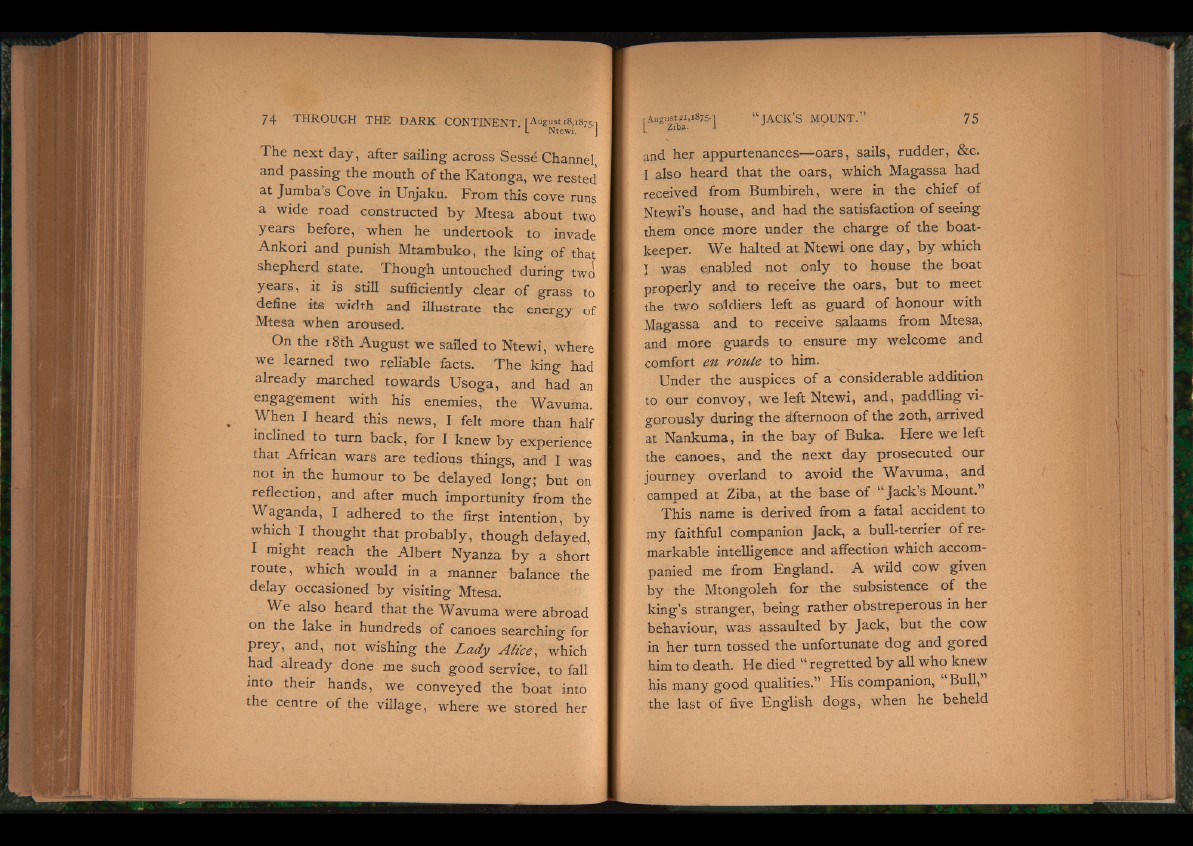
L Ntewi. j
The next d a y , after sailing across Sesse Channel,
and passing the mouth o f the Katonga, we rested
at Jumba’s Cove in Unjaku. From this cove runs
a wide road constructed b y Mtesa about two
years before, when he undertook to invade
Ankori and punish Mtambuko, the king o f that
shepherd state. Though untouched during two
y e a r s , it is still sufficiently clear o f grass to
define its width and illustrate the energy of
Mtesa when aroused.
On the 18th August we sailed to Ntewi, where
we learned two reliable facts. The king had
already marched towards Usoga, and had an
engagement with his enemies, the Wavuma.
When I heard this news, I felt more than half
inclined to turn back, for I knew b y experience
that African wars are tedious things, and I was
not in the humour to be delayed long; but on
reflection, and after much importunity from the
Waganda, I adhered to the first intention, by
which I thought that prob ably, though delayed,
I might reach the Albert Nyanza b y a short
route, which would in a manner balance the
delay occasioned b y visiting Mtesa.
W e also heard that the Wavuma were abroad
on the lake in hundreds o f canoes searching for
p re y , and, not wishing the Lady A lic e , which
had already done me such go od service, to fall
into their hands, we conveyed the boat into
the centre o f the village, where we stored her
r A u g u s t 2 1 , 1 8 7 5 . '! “ j a c k ’s m o u n t . ”
[ Ziba. J
and her appurtenances— oars, sails, rudder, &c.
I also heard that the oars, which Magassa had
received from Bumbireh, were in the chief o f
Ntewi’s house, and had the satisfaction of seeing
them once more under the charge o f the boat-
keeper. W e halted at Ntewi one d ay , b y which
I was enabled not only to house the boat
properly and to receive the oars, but to meet
the two soldiers left as guard o f honour with
Magassa and to receive salaams from Mtesa,
and more guards to ensure my welcome and
comfort en route to him.
Under the auspices o f a considerable addition
to our convoy, we left Ntewi, and, paddling vigorously
during the dfternoon o f the 20th, arrived
at Nankuma, in the b a y o f Buka. Here we left
the canoes, and the next day prosecuted our
journey overland to avoid the Wavuma, and
camped at Ziba, at the b a s e o f “ J a cks Mount.
This name is derived from a fatal accident to
my faithful companion Jack, a bull-terrier o f remarkable
intelligence and affection which accompanied
me from England. A wild cow given
b y the Mtongoleh for the subsistence o f the
king’s stranger, being rather obstreperous in her
behaviour, was assaulted b y Jack, but the cow
in her turn tossed the unfortunate d o g and gored
him to death. He died “ regretted b y all who knew
his many good qualities.” His companion, Bull,
the last o f five English dogs, when he beheld